

What are cognitive abilities? Summary. This video provides a brief introduction to what cognitive abilities are and how we use them in our daily lives. What Is Cognitive Processing? Summary. Normal Cognitive Aging - Common Aging Changes in Cognition. When should I be worried about my cognitive abilities decline? Refer to the table in this webpage to have a brief guide on what are some of the normal age-related cognitive abilities decline. Scientists used to think that brain connections developed at a rapid pace in the first few years of life, until you reached your mental peak in your early 20s.
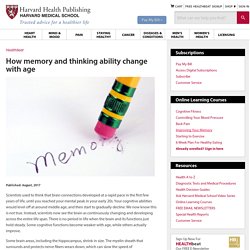
Your cognitive abilities would level off at around middle age, and then start to gradually decline. We now know this is not true. Instead, scientists now see the brain as continuously changing and developing across the entire life span. There is no period in life when the brain and its functions just hold steady. Some cognitive functions become weaker with age, while others actually improve. Some brain areas, including the hippocampus, shrink in size. On the other hand, the branching of dendrites increases, and connections between distant brain areas strengthen. Age is also the biggest risk factor for many brain diseases, most of which affect brain structure and function. As a result of these changes, you will likely start to notice slight slips in your memory in middle age and beyond. Cognitive Impairment. Dementia - WHO.
Dementia is a syndrome – usually of a chronic or progressive nature – in which there is deterioration in cognitive function (i.e. the ability to process thought) beyond what might be expected from normal ageing.
This resource explains more about what dementia is and its effects. In relevance with our topic, this resource talks about how dementia can cause decline in cognitive abilities such as memory, thinking, learning capacity and judgement. It also highlights symptoms of dementia in various stages so that individuals can monitor themselves or their loved ones based on these symptoms. One significant highlight of this resource is the information under "Treatment and care". Under that section, it is mentioned that "optimizing physical health, cognition, activity and well-being" is one of the ways to fulfill dementia care. This brings us to our main purpose of this resource centre, which is to show why it is important for older adults to remain active to maintain their cognitive abilities. – ginnong
It affects memory, thinking, orientation, comprehension, calculation, learning capacity, language, and judgement.
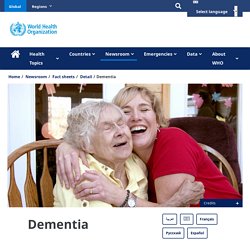
Consciousness is not affected. The impairment in cognitive function is commonly accompanied, and occasionally preceded, by deterioration in emotional control, social behaviour, or motivation. Dementia results from a variety of diseases and injuries that primarily or secondarily affect the brain, such as Alzheimer's disease or stroke. Dementia is one of the major causes of disability and dependency among older people worldwide. Staying active. Summary. Enrichment Effects on Cognitive Development. Maintaining cognitive health in an ageing society. Normal Cognitive Aging - Avoiding Cognitive Decline.
Cognitive Health and Older Adults. Cognitive health—the ability to clearly think, learn, and remember—is an important component of brain health.
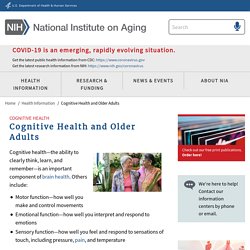
Others include: Staying active through different ways! There are many things you can do to help yourself age well: exercise and be physically active, make healthy food choices, and don’t smoke.
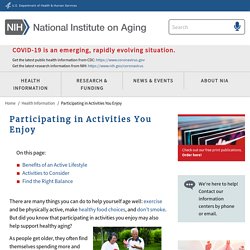
But did you know that participating in activities you enjoy may also help support healthy aging? As people get older, they often find themselves spending more and more time at home alone. Staying PHYSICALLY active. Summary. Effects of Exercise on Cognitive Abilities of Older Adults. Combining physical activity and cognitive activity. Physical activity and cognition. Physical activity and cognitive function in older women. Physical Activity for Older Adults. Significant health benefits are seen in adults aged 65 years and older who participate in regular physical activity.
This webpage provides easy-to-understand information on some physical activities that are suitable for older adults. – ginnong
The 2008 Physical Activity Guidelines recommend older adults to incorporate aerobic activity, muscle-strengthening activity, and balance training for older adults at risk for falls.
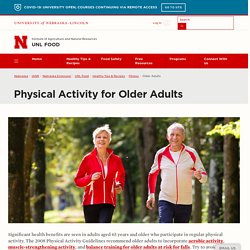
Try to avoid inactivity because some health benefits can occur with any amount of physical activity gain. Older adults need to evaluate their level of fitness before determining their level of effort for physical activity. Chronic conditions need to be taken into consideration since they may affect their ability to do regular physical activity safely. Try this workout! 15-minute Sample Workout for Older Adults (Go4Life) 7 Easy Exercises to an Active Lifestyle (Full Version in English) Staying MENTALLY active. Summary. Cognitive aging - Activity patterns and maintenance intentions.
This study even though looks at the three aspects - staying physically, mentally and socially active - to maintain cognitive abilities, it has strongly highlighted how staying mentally active can support the maintenance of cognitive abilities in older adults. Some examples of mentally stimulating activities they looked at were: reading, playing games (chess, cards, bingo, etc.), working with computer, writing and knitting. – ginnong
6 Best Cognitive Games and Activities for Seniors. Has a senior loved one struggled to recall the name of an old friend or remember the street that their first house was located on?
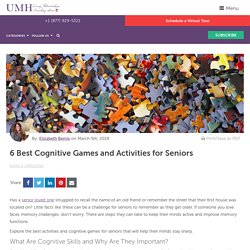
Little facts like these can be a challenge for seniors to remember as they get older. If someone you love faces memory challenges, don’t worry. There are steps they can take to keep their minds active and improve memory functions. Explore the best activities and cognitive games for seniors that will help their minds stay sharp. Try some Sudoku!
Brain Game Examples. The Best Brain Games for Seniors. By Donna McHugh, Regional Director, Community Partnerships on Jan 2, 2019 11:55:56 AM As you age, you may find yourself or someone you love becoming a bit more forgetful, or maybe you keep misplacing things.
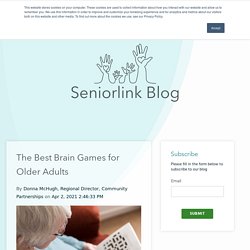
While frequent forgetfulness or severe memory loss may be a sign of Alzheimer’s disease, some forgetfulness is a normal part of aging. While it’s not preventable, there are things you can do to slow down the brain aging process. Keeping your brain active, much like your body, is very important at all times of life. By solving brain games and puzzles, you’re working out your brain and reducing your brain age. As you look through this list of the best brain games for seniors, consider these factors: You’ll find brain games in plenty of different formats, from classic board games to word puzzles and even online video games. Brain games for the elderly that improve mental health and memory - SuperCarers.
Staying SOCIALLY active. Summary. Social Engagement and Cognitive Function. Social Networks, social integration and social engagement determining cognitive decline.
This study looked into how social engagement and social support can support an individual's cognition. An interesting finding of this study is that having more frequent social engagement has been identified to positively impact more domains of cognitive abilities as compared to receiving consistent social support. – ginnong
What are some social activities ideas? Social engagement contributing to mental stimulation? Social Engagement and Cognition - When I'm 64 - NCBI Bookshelf.
This section of the book, "When I'm 64", differs from other articles discussing about how social engagement can maintain the cognitive abilities of older adults. This is because besides focusing on staying socially active, this extract draws attention to how being socially active can help to engage the intellectual skills of an individual, thus promoting mental stimulation. This mental stimulation can then improve a person's cognitive function. – ginnong